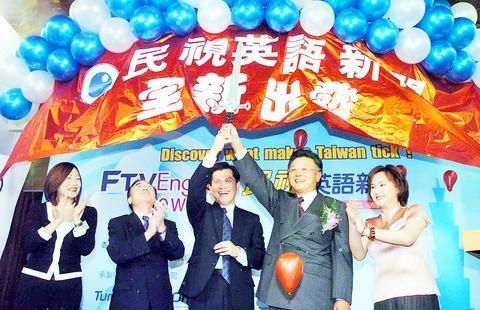Beginning Monday, Formosa Television (FTV) will present an hour-long English-language nightly news program to help foreigners better understand Taiwan.
From Sept. 13 onwards, FTV English news will be aired on FTV News Station at 11pm, and will be rerun at 6am the following morning on FTV's terrestrial station. In addition, the program will be aired on International Community Radio Taipei FM 100 the following morning from 5:30am to 6am from Tuesday to Friday.

PHOTO: CHIANG YING-YING, TAIPEI TIMES
The news anchors selected for the program are Jinny Chang (張嘉欣) and Jeffrey Mindich.
"After this re-organization, FTV's English-language news is going from 15 minutes to an hour long. This news program will serve as a window through which Taiwan's national image is presented, as well as providing an environment to learn English. The news program is not simply a replica of the Chinese-language news program, but has its own specialized team, which handles everything from production to conducting interviews," Government Information Office (GIO) Director-General Lin Chia-lung (林佳龍) said at the program's launching ceremony yesterday at the SPOT-Taipei Film House. Organizers said the location was selected due to its past -- between 1949 and 1978 the house served as the US ambassador's official residence.
"I hope that this news program in the future may serve as a cultural export to promote Taiwan. Right now, Taiwanese news programs aired overseas are in Chinese, which foreigners may not understand," Lin said.
FTV's chief said the English-language news program was produced out of good will, rather than a desire to make a profit.
"So far, FTV has put NT$50 million into its English-language news programs. FTV is the only television station in Taiwan which still produces news programs in English. However, despite the lack of a financial return, FTV insists on presenting local and international news in English, hoping to connect with the world and echoing President Chen Shui-bian's (陳水扁) desires," said FTV General Manager Chen Kang-hsin (陳剛信).

A preclearance service to facilitate entry for people traveling to select airports in Japan would be available from Thursday next week to Feb. 25 at Taiwan Taoyuan International Airport, Taoyuan International Airport Corp (TIAC) said on Tuesday. The service was first made available to Taiwanese travelers throughout the winter vacation of 2024 and during the Lunar New Year holiday. In addition to flights to the Japanese cities of Hakodate, Asahikawa, Akita, Sendai, Niigata, Okayama, Takamatsu, Kumamoto and Kagoshima, the service would be available to travelers to Kobe and Oita. The service can be accessed by passengers of 15 flight routes operated by

Alain Robert, known as the "French Spider-Man," praised Alex Honnold as exceptionally well-prepared after the US climber completed a free solo ascent of Taipei 101 yesterday. Robert said Honnold's ascent of the 508m-tall skyscraper in just more than one-and-a-half hours without using safety ropes or equipment was a remarkable achievement. "This is my life," he said in an interview conducted in French, adding that he liked the feeling of being "on the edge of danger." The 63-year-old Frenchman climbed Taipei 101 using ropes in December 2004, taking about four hours to reach the top. On a one-to-10 scale of difficulty, Robert said Taipei 101

Taiwanese and US defense groups are collaborating to introduce deployable, semi-autonomous manufacturing systems for drones and components in a boost to the nation’s supply chain resilience. Taiwan’s G-Tech Optroelectronics Corp subsidiary GTOC and the US’ Aerkomm Inc on Friday announced an agreement with fellow US-based Firestorm Lab to adopt the latter’s xCell, a technology featuring 3D printers fitted in 6.1m container units. The systems enable aerial platforms and parts to be produced in high volumes from dispersed nodes capable of rapid redeployment, to minimize the risk of enemy strikes and to meet field requirements, they said. Firestorm chief technology officer Ian Muceus said

MORE FALL: An investigation into one of Xi’s key cronies, part of a broader ‘anti-corruption’ drive, indicates that he might have a deep distrust in the military, an expert said China’s latest military purge underscores systemic risks in its shift from collective leadership to sole rule under Chinese President Xi Jinping (習近平), and could disrupt its chain of command and military capabilities, a national security official said yesterday. If decisionmaking within the Chinese Communist Party has become “irrational” under one-man rule, the Taiwan Strait and the regional situation must be approached with extreme caution, given unforeseen risks, they added. The anonymous official made the remarks as China’s Central Military Commission Vice Chairman Zhang Youxia (張又俠) and Joint Staff Department Chief of Staff Liu Zhenli (劉振立) were reportedly being investigated for suspected “serious